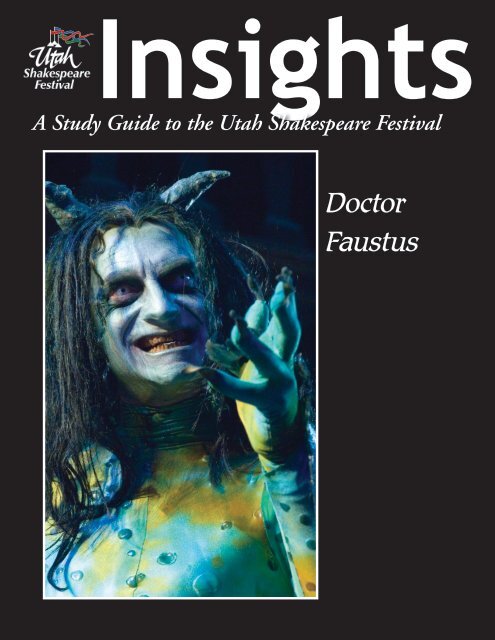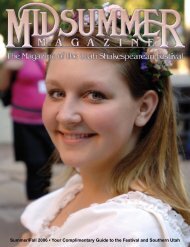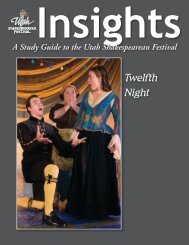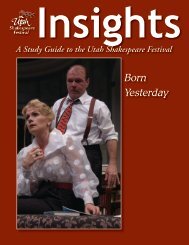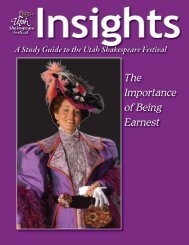Doctor Faustus - Utah Shakespearean Festival
Doctor Faustus - Utah Shakespearean Festival
Doctor Faustus - Utah Shakespearean Festival
Create successful ePaper yourself
Turn your PDF publications into a flip-book with our unique Google optimized e-Paper software.
Insights<br />
A Study Guide to the <strong>Utah</strong> Shakespeare <strong>Festival</strong><br />
<strong>Doctor</strong><br />
<strong>Faustus</strong>
The articles in this study guide are not meant to mirror or interpret any productions at the <strong>Utah</strong> Shakespeare<br />
<strong>Festival</strong>. They are meant, instead, to be an educational jumping-off point to understanding and enjoying the plays (in<br />
any production at any theatre) a bit more thoroughly. Therefore the stories of the plays and the<br />
interpretative articles (and even characters, at times) may differ dramatically from what is ultimately produced<br />
on the <strong>Festival</strong>’s stages.<br />
Insights is published by the <strong>Utah</strong> Shakespeare <strong>Festival</strong>, 351 West Center Street; Cedar City, UT 84720. Bruce C.<br />
Lee, communications director and editor; Phil Hermansen, art director.<br />
Copyright © 2011, <strong>Utah</strong> Shakespeare <strong>Festival</strong>. Please feel free to download and print Insights, as long as you do not<br />
remove any identifying mark of the <strong>Utah</strong> Shakespeare <strong>Festival</strong>.<br />
Cover photo: Ben Livingston in <strong>Doctor</strong> <strong>Faustus</strong>, 2005.<br />
For more information about <strong>Festival</strong> education programs:<br />
<strong>Utah</strong> Shakespeare <strong>Festival</strong><br />
351 West Center Street<br />
Cedar City, <strong>Utah</strong> 84720<br />
435-586-7880<br />
www.bard.org.
<strong>Doctor</strong> <strong>Faustus</strong><br />
Contents<br />
Information on the Play<br />
Synopsis 4<br />
Characters 5<br />
About the Playwright 5<br />
Scholarly Articles on the Play<br />
His Waxen Wings Did Mount 7<br />
<strong>Utah</strong> Shakespeare <strong>Festival</strong><br />
351 West Center Street • Cedar City, <strong>Utah</strong> 84720 • 435-586-7880<br />
3
4<br />
Synopsis: <strong>Doctor</strong> <strong>Faustus</strong><br />
<strong>Doctor</strong> <strong>Faustus</strong>, a talented German scholar who decries the limits of human knowledge,<br />
believes that he has learned all that can be learned by conventional means. What is left for him, he<br />
thinks, but magic? He is offered a choice of Christian conscience by a good angel, and the path to<br />
damnation by an evil angel.<br />
Two fellow scholars, Valdes and Cornelius, teach him the fundamentals of black magic.<br />
Eventually, <strong>Faustus</strong> summons the devil Mephistopheles and the terms of their pact are agreed<br />
upon. In return for his immortal soul, <strong>Faustus</strong> will be granted twenty-four years of power, with<br />
Mephistopheles as his servant.<br />
<strong>Faustus</strong> begins to have second thoughts, but he rationalizes them away and signs away his soul<br />
in his own blood. He receives a warning and is nearly overcome by fear. Mephistopheles distracts<br />
him with a dance of devils and gives him a book filled with knowledge.<br />
<strong>Faustus</strong>, after some time, curses Mephistopheles for causing him to lose any prospect of heaven.<br />
He finds he can torment the devil by mentioning the name of deity. The good angel and the evil<br />
angel arrive again, one advising him to repent, the other telling him to hold to the course of wickedness.<br />
Beelzebub and Mephistopheles return to intimidate him, and he agrees to think of God no<br />
more. Meanwhile, Robin the Clown has found one of <strong>Faustus</strong>’s magic books.<br />
Riding in a chariot drawn by dragons, <strong>Faustus</strong> has explored the heavens and earth and flies to<br />
Rome where the feast honoring St. Peter is to be celebrated. <strong>Faustus</strong> and Mephistopheles make<br />
themselves invisible and play a number of tricks before leaving. <strong>Faustus</strong> returns home where his illgotten<br />
knowledge and abilities gain him renown. Meanwhile, Robin the Clown has learned some<br />
magic of his own.<br />
At the court of Charles V, <strong>Faustus</strong> delights the emperor with illusions and humiliates a knight,<br />
whose attempts to get even result in more humiliation for him.<br />
<strong>Faustus</strong> continues to use his powers to swindle and humiliate anyone he pleases. Several of his<br />
victims, together with Robin the Clown, go to the court of the duke in order to get some justice<br />
done, if possible. <strong>Faustus</strong> wins over the duke and duchess with petty illusions, and toys with Robin.<br />
Time is running out for <strong>Faustus</strong>. We learn from Wagner that his master is probably preparing<br />
for death. Even so, there is no repentance evident as <strong>Faustus</strong> feasts and drinks the time away<br />
with other scholars. He summons a spirit to take the appearance of Helen of Troy and asks<br />
Mephistopheles to bring Helen to him so she can give him comfort and love during his remaining<br />
time.<br />
Finally, <strong>Faustus</strong> reveals to his friends that he is a damned soul and that his powers came at a<br />
high price. They leave him to his fate.<br />
Mephistopheles taunts <strong>Faustus</strong>, and <strong>Faustus</strong> blames him for his damnation. The devil gladly<br />
takes credit, as the good and evil angels arrive for the last time. The clock strikes eleven, and<br />
<strong>Faustus</strong>’s final monologue reveals his regret. At midnight, the devils enter as <strong>Faustus</strong> begs God and<br />
the devil for mercy, but there is no mercy as <strong>Faustus</strong> is dragged down to hell.<br />
In the epilogue, the Chorus reveals that <strong>Faustus</strong> is gone, and all his great potential has been<br />
wasted. We are warned to remember his fall and the lessons it affords.<br />
Characters: <strong>Doctor</strong> <strong>Faustus</strong><br />
<strong>Utah</strong> Shakespeare <strong>Festival</strong><br />
351 West Center Street • Cedar City, <strong>Utah</strong> 84720 • 435-586-7880
Chorus: Usually a single actor, the Chorus relates the prologue which introduces much of the plot,<br />
tells of <strong>Faustus</strong>’s magical experiences as the devil’s promises are fulfilled, and who also offers the<br />
final comments at play’s end.<br />
<strong>Doctor</strong> <strong>Faustus</strong>: A brilliant scholar, <strong>Doctor</strong> <strong>Faustus</strong> sells his soul to the devil in exchange for limitless<br />
knowledge and powerful black magic, which leaves him yet unfulfilled. Even when repentance is<br />
still within his grasp, he is too proud to ask God for forgiveness, and his pride ultimately seals his<br />
fate.<br />
Wagner: <strong>Faustus</strong>’s student and servant, Wagner presses Robin the clown into service as his own servant.<br />
He and Robin eventually acquire some magical abilities of their own.<br />
Good Angel: Trying to save his subject’s soul, the Good Angel attempts to convince <strong>Faustus</strong> on several<br />
occasions that repentance is still possible and that he must turn away from the devil and his<br />
enticements.<br />
Evil Angel: The opposing force, the bad angel convinces <strong>Faustus</strong> that repentance is not possible and<br />
that devils will tear him in pieces if he tries.<br />
Valdes: A magician, Valdes instructs <strong>Faustus</strong> in the art of black magic.<br />
Cornelius: Another magician, Cornelius also instructs <strong>Faustus</strong> in the art of black magic.<br />
Three Scholars: Students of <strong>Faustus</strong>, the Three Scholars come in search of <strong>Faustus</strong> early in the play,<br />
only to find that he has fallen into a damned art from which he may not be able to be reclaimed.<br />
At play’s end, they find <strong>Faustus</strong>’s remains after the devils have made their claim on him.<br />
Lucifer: The prince of devils, Lucifer convinces <strong>Faustus</strong>, through various enticements, to give up his<br />
prayers to God once and for all and to agree to a pact with him.<br />
Mephistopheles: Lucifer’s henchman, he serves to satisfy <strong>Faustus</strong>’s wishes and demands. He occasionally<br />
torments and is tormented by <strong>Faustus</strong> and becomes his constant companion.<br />
Robin: A servant and clown to Wagner and a sometimes magician.<br />
Beelzebub: A devil.<br />
Pride, Covetousness, Envy, Wrath, Gluttony, Sloth, Lechery: The seven deadly sins, they are led<br />
by a piper and appear before, even delighting, <strong>Faustus</strong> with the prospect of what he might find in<br />
hell.<br />
Dick: A clown.<br />
Pope Adrian: Having grown arrogant and abusive in his power, Pope Adrian becomes a prospect for<br />
humiliation at the hands of <strong>Faustus</strong> and Mephistopheles, who disguise themselves as cardinals<br />
and cause mass confusion.<br />
Friars: Assigned by Adrian, they curse, with bell, book and candle, the “spirit” which has upset the<br />
pope’s banquet.<br />
Vintner: He accuses Robin and Dick of stealing a cup from the tavern.<br />
Charles V: The German emperor, Charles V is responsible for appointing Bruno as a rival to Pope<br />
Adrian. He admires <strong>Faustus</strong>’s ability as a conjurer and enjoys the tricks played on his courtiers.<br />
Horse-Courser: A clown, the Horse-Courser makes the mistake of buying a horse from <strong>Faustus</strong>.<br />
Duke of Vanholt: <strong>Faustus</strong> performs his conjuring tricks for the duke’s amusement.<br />
Duchess of Vanholt: She also is amused by <strong>Faustus</strong>’s magical tricks.<br />
Old Man: Appearing at the play’s end, the Old Man attempts to convince <strong>Faustus</strong> that there is still<br />
time to repent and save his soul from hell.<br />
Various Mute Characters, including Alexander the Great, Alexander’s Paramour, Helen of Troy,<br />
Devils, Friars, Attendants, Soldiers, and Servants<br />
By Marlo M. Ihler<br />
About the Playwright<br />
<strong>Utah</strong> Shakespeare <strong>Festival</strong><br />
351 West Center Street • Cedar City, <strong>Utah</strong> 84720 • 435-586-7880<br />
5
6<br />
From Insights, 2005<br />
Christopher Marlowe, dramatist and poet, was born in Canterbury, England, February<br />
6, 1564, the same year as William Shakespeare. Generally considered the founder of English<br />
drama and the father of dramatic blank verse, he prepared the way for Shakespeare and other<br />
Elizabethan poets and dramatists.<br />
Details of his early life are limited: he was raised in a middle-class family as the son of a<br />
shoemaker. Just prior to his fifteenth birthday, he secured a coveted opening at the prestigious<br />
King’s School in Canterbury where he attended on scholarship. Here he received a rigorous<br />
education, receiving highly-rated training in religion, music, Latin, Greek, classic literature,<br />
writing, and history.<br />
He continued his education at Corpus Christi College (then Benet College) in Cambridge<br />
where he received his B.A. in 1584 and his M.A. in 1587. According to school records, his normally<br />
consistent attendance was often interrupted by frequent absences during his last years of<br />
school, jeopardizing his master’s degree. This, in addition to his refusal to take holy orders into<br />
the Anglican Church as his scholarship required, resulted in the university officials’ refusal to<br />
award his degree. However, Queen Elizabeth’s Privy Council intervened in his favor, and the<br />
degree was finally granted.<br />
Due to the Queen’s special intervention on his behalf, it is believed that Marlowe was affiliated<br />
with her secret service, an intelligence and diplomatic operation and the most successful<br />
espionage network of the day (http://www.marlowe-society.org, 2005). He assisted in uncovering<br />
plots against the queen by the Catholics who wanted her off the throne, the most famous<br />
being the Babington Plot.<br />
Marlowe moved to London following his schooling, where, again, little is known about his<br />
life. It is known that here he began his career as a playwright and actor for the Lord Admiral’s<br />
Company, and may have continued as a spy in the service of the queen. He also became associated<br />
with a colorful and intellectual social circle that called themselves The School of the<br />
Night or Free-Thinkers. Sir Walter Raleigh and the young earl of Northumberland, Henry<br />
Percy, led this group of “advanced-thinking” noblemen, scientists, travelers, philosophers, and<br />
poets (http://www.marlowe-society.org, 2005). They met secretly to discuss forbidden topics<br />
and thus were considered atheists by many.<br />
In 1593, following torture by the Queen’s Privy Council, a one-time friend and fellow playwright,<br />
Thomas Kyd, accused Marlowe of heresy and atheism, a most serious crime. But before<br />
he could be brought before the council, the twenty-nine year old poet and playwright was<br />
stabbed to death at an inn in Deptford in an argument over the bill. There is reason to believe,<br />
however, that Marlowe may have been deliberately provoked and murdered in order to prevent<br />
his arrest, which could have led to the implication of important men such as Raleigh (http://<br />
www.imagi-nation.com/moonstruck/clsc24.html, 2005).<br />
Marlowe’s untimely death brought an end to his short but brilliant career. His writings<br />
include seven plays, the four most important being Tamburlaine the Great (Parts 1 and 2)<br />
(1586-87), The Jew of Malta (1589), Edward II (1592) and <strong>Doctor</strong> <strong>Faustus</strong> (1592-93). Other<br />
works include translations of the Latin poets Ovid and Lucan, and the mythological poem<br />
Hero and Leander (1593), which was completed by George Chapman. His education shaped<br />
him into an innovative genius who first conceived and created blank verse drama. This is<br />
why Alfred Lord Tennyson wrote: “If Shakespeare is the dazzling sun of this mighty period,<br />
Marlowe is certainly the morning star” (http://www.marlowe-society.org, 2005).<br />
Marlowe’s dramas consist of heroic themes that usually focus on characters who are<br />
destroyed by their own ambitions and passions. Tamburlaine the Great caused the greatest<br />
<strong>Utah</strong> Shakespeare <strong>Festival</strong><br />
351 West Center Street • Cedar City, <strong>Utah</strong> 84720 • 435-586-7880
excitement among his contemporaries. Its gallant theme, splendid blank verse, and the color and<br />
scale of its pageantry led to its constant revival, with the great English actor Edward Alleyn of the<br />
Lord Admiral’s Company taking the role of Tamburlaine. Alleyn also played the lead roles in The<br />
Jew of Malta and <strong>Doctor</strong> <strong>Faustus</strong>.<br />
The Jew of Malta may be considered the first successful tragi-comedy, and provided inspiration<br />
for Shakespeare’s ShylockMost authorities detect influences of Marlowe’s writings in other works of<br />
Shakespeare, specifically Titus Andronicus and Henry VI.<br />
Edward II is considered probably the earliest successful historical drama. It contains superior<br />
verse and the compelling portrayal of a flawed and weak ruler. This play paved the way for the histories<br />
of Shakespeare, such as Richard II, Henry IV, and Henry V.<br />
Of all of Marlowe’s works that made him one of the most prominent Elizabethan dramatists,<br />
<strong>Doctor</strong> <strong>Faustus</strong> has remained the most famous. The story of Faust is a prevalent and an important<br />
one in literature, having been told and retold throughout the centuries. Marlowe’s Faust powerfully<br />
exemplifies the intellectual aspirations of the Renaissance, but he recognizes and is haunted by their<br />
vanity and sinfulness. In his thirst for knowledge and power, he discards orthodox methods and<br />
turns to magic and less reputable means to satiate his desires, eventually selling his soul to the devil.<br />
The outcome is ruin, tragedy, and damnation (The Norton Anthology of World Masterpieces, fifth<br />
edition, Vol. 1, p. 1829)<br />
Marlowe’s writings are important, not only because of the skill with which he wrote, but also<br />
for his artistic and imaginative genius. He returned high poetry to its rightful place on the stage<br />
and left us characters as fiery and passionate as their creator, preparing the way for other great dramatists<br />
to follow (http://www.imagi-nation.com/moonstruck/clsc24.html, 2005).<br />
<strong>Doctor</strong> <strong>Faustus</strong>: “His Waxen Wings Did<br />
Mount above His Reach”<br />
<strong>Utah</strong> Shakespeare <strong>Festival</strong><br />
351 West Center Street • Cedar City, <strong>Utah</strong> 84720 • 435-586-7880<br />
7
8<br />
By Diana Major Spencer<br />
From Insights, 2005<br />
“All men possess by nature a craving for knowledge,” Aristotle observed in the first chapter<br />
of the first book of his Metaphysics. The common label for our species presumes the capacity<br />
for knowledge: Homo sapiens, Latin for man + wisdom. At least since the Renaissance we have<br />
considered knowledge and the quest for knowledge to be positive pursuits leading to wisdom.<br />
We send our children to school to gain knowledge and, we hope, make good use of it. Some of<br />
us make careers of fostering, spoon-feeding and jack-hammering the intake of knowledge, certain<br />
that our contributions improve the human lot, but fearful that rising generations may not<br />
absorb enough to make wise decisions in our feeble years.<br />
At the same time, we use “egghead,” “brain,” and “know-it-all” as slurs of mistrust toward<br />
those who know too much. Ordinary schoolchildren, who know “enough,” carry their scorn<br />
for the intellectually gifted into adulthood. We humans crave knowledge, as Aristotle noted,<br />
but also fear it. Herein, perhaps, lie the fascination and terror we find in Faust’s relentless quest.<br />
Christopher Marlowe presents a Faust of magnificent capacity and achievement who lets his<br />
superior knowledge dictate a downward path, the fruits of his bargain being a few petty practical<br />
jokes and a kiss from Helen. Liking Faust is difficult, yet he pulls us toward him with the<br />
force of our ambivalence toward knowledge.<br />
The opening Chorus expresses great admiration and high hopes for the learned doctor:<br />
“So soon he profits in divinity, / The fruitful plot of scholarism graced, / That shortly he was<br />
graced with <strong>Doctor</strong>’s name / Excelling all whose sweet delight disputes / In heavenly matters<br />
of theology” (Chorus 16-20). Marlowe loads these lines with religious terminology, associating<br />
divinity with profit (“good ends”); “scholarism” and “<strong>Doctor</strong>’s name” with grace; and Faust’s<br />
excellence above all others in discussing heavenly theology with delight.<br />
Then Faust appears. He has acquired enviable knowledge in diverse fields, but finds them<br />
all lacking. What are the rewards for his brilliance, he wonders. He could be a theologian, but<br />
his true passion is secular philosophy (i.e., Aristotle) (1.3-5). Yet, since he already knows philosophy<br />
inside out, “[a] greater subject fitteth <strong>Faustus</strong>’ wit”: maybe medicine (1.10-12). Still,<br />
the most “wondrous cure” falls short of raising the dead to life, thus leaving Faust mortal and<br />
therefore ordinary; perhaps law would offer a worthier challenge (16-30). On the contrary,<br />
such “study fits a mercenary drudge / Who aims at nothing but external trash, / Too servile<br />
and illiberal for me” (1.35-37). Divinity likewise leads nowhere: “If we say that we have no<br />
sin / We deceive ourselves, and there’s no truth in us. / Why then belike / We must sin and so<br />
consequently die, / Ay, we must die an everlasting death” (1.45-49). Note the circle that begins<br />
with theology and ends with divinity, outside which Faust places himself.<br />
We still identify with him, however. Faust wants more challenge, more reward for his intellectual<br />
prowess-as others certainly do. Do we change jobs or even professions? Do we accept or<br />
maneuver advancements? Do we leave the disciplines for administration—at the peril of our<br />
souls? How many of us have sighed, “What I wouldn’t give for—whatever”? So Faust chooses<br />
necromancy as a means to extend his reach: “O what a world of profit and delight, / Of power,<br />
of honor, of omnipotence[!]” (1.56-57). “[H]is dominion that succeeds in [necromancy]/<br />
Stretcheth as far as doth the mind of man./ A sound magician is a mighty god:/ Here, <strong>Faustus</strong>,<br />
try thy brains to find a deity!” (1.63-66). The language of theology—profit and delight, which<br />
the Chorus introduced earlier, omnipotence, dominion, god, and deity-reappears, but now<br />
appropriated by Faust to himself-not God. Faust chooses pride and power over wisdom as his<br />
purpose.<br />
Faust is a troubled—and troubling—character, especially for lovers of knowledge. My<br />
<strong>Utah</strong> Shakespeare <strong>Festival</strong><br />
351 West Center Street • Cedar City, <strong>Utah</strong> 84720 • 435-586-7880
greatest pleasure is learning. I even know things I wish I didn’t. Nevertheless, knowledge is<br />
not of itself either good or evil; it may be about good or evil matter (hence, questions of censorship)<br />
or it may be applied to good or evil ends (hence, questions of individual freedom).<br />
Research and discovery tell us that all knowledge is not as yet available; and questions of faithsuch<br />
as Job’s or Boethius’s or Rabbi Kushner’s-tell us that some knowledge is inaccessible to,<br />
perhaps unattainable by, the finite human mind. Some knowledge—the occult, for instance—is<br />
flatly taboo (if we moderns can acknowledge prohibitions in what we say, do, or entertain).<br />
Faust, indulging his pride and wallowing in his power of free will, deliberately and stubbornly,<br />
despite warnings and omens, boldly chooses to sacrifice his eternal soul for forbidden<br />
knowledge, specifically those otherworldly powers inaccessible to human intellect without<br />
infernal aid. The Renaissance celebrated intellectual curiosity and trusted the potentialities of<br />
the human mind, but witchcraft lurked and thinkers who probed secrets of God’s divine universe<br />
suffered punishment. The same ambivalence about knowledge survives even now-though<br />
we believe we are beyond superstition (knock on wood). We want to know everything-without<br />
going too far.<br />
Thematically, Faust belongs with Eve and Adam, Prometheus, Pandora and other transgressors<br />
from western mythologies who sullied life for the rest of us by exercising their curiosities<br />
beyond proscribed bounds and releasing evil (i.e., knowledge) into the human community.<br />
Even so, the sin of these ancients was disobedience, not arrogance. Faust, however, is a modern<br />
man-one of us-belonging also with Columbus (who ventured beyond the horizon), Galileo<br />
(who pried into God’s design), Edison (who destroyed God’s division of night and day), Fermi<br />
(who split the atom), and others who deliberately seek to understand and harness secrets of<br />
nature. Science and technology, some outside Science Departments sometimes say, certainly<br />
encroach upon forbidden knowledge, despite their apparent benefits to comfort and plenitude.<br />
Stories and puppet plays about bargaining with the devil for secret knowledge originated<br />
in the late Middle Ages, just as secular learning was emerging as a viable, though not entirely<br />
acceptable, alternative to authority. During the 1500s these stories became associated with a<br />
minor German scholar, Johann Faust, who dabbled in the black arts and was immortalized,<br />
ironically, in a ferocious Lutheran Faustbuch of 1587. Faust thus becomes a cautionary tale,<br />
warning the world of the infernal consequences of knowledge ill-chosen, ill-gotten, and illused.<br />
If we are to seek knowledge, the lesson goes, we must do so with humility, responsibility,<br />
and generosity toward our fellow creatures. And please, Faust’s end reminds us, please, stay<br />
within the proper bounds!<br />
<strong>Utah</strong> Shakespeare <strong>Festival</strong><br />
351 West Center Street • Cedar City, <strong>Utah</strong> 84720 • 435-586-7880<br />
9


